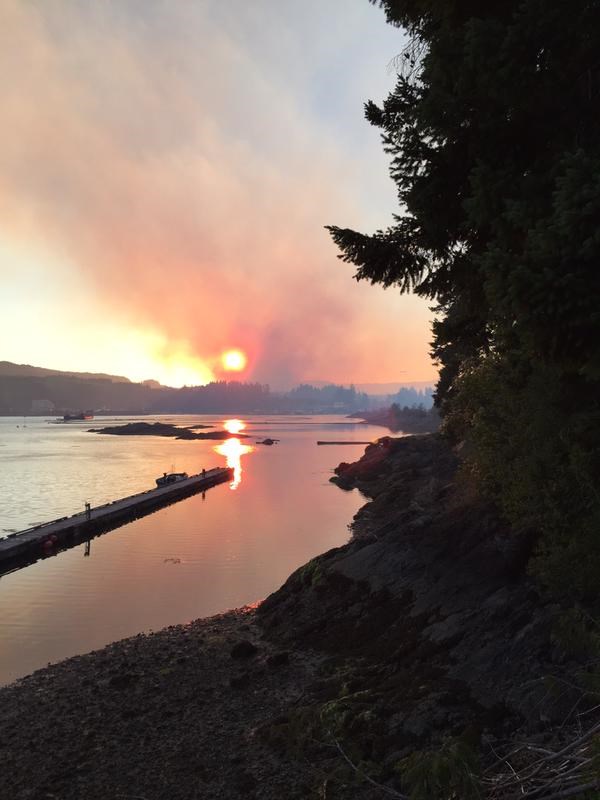Update:
Port Hardy remains under a state of emergency and an evacuation notice is in place for Mayors Way and Upper Carnarvon.
The district says fire did not spread overnight. It is categorized as Rank 1, which means it is a slow-moving ground fire.
The main 16-hectare fire is 20 per cent contained on the end closest to town. Ground crews continue to focus on this area, according to the district.
The one-hectare spot fire behind the evacuated homes remains at 80 per cent contained as of 9:50 a.m.
The district expects the assistance of one heavy helicopter and three intermediate helicopters actively working the fire today.
Today is expected to be the hottest and driest day yet. No interruption in water service is planned this morning but strict conservation is requested.
Original story:
The whirring of helicopter blades was heard throughout Port Hardy on Saturday as firefighters attacked a blaze about 1.5 kilometres west of the north Island town.
A state of emergency, which will allow the district to bill the province for expenses incurred during the blaze, was declared Saturday morning.
More resources were brought in during the afternoon.
“It’s still volatile, but we’re continuing to put more resources to it and we’re confident we’ll get this under control at some point,” said Hank Bood, mayor of Port Hardy, which has a population of about 4,000.
As many as 100 homes on Mayors Way and Upper Carnarvon were evacuated, affecting between 150 and 200 people. Bood said most were staying with family and friends.
The fire, which sent ash falling over the community, began Friday night on the Tsulquate River, a heavily timbered area west of Port Hardy.
Officials believe it was human-caused. “A fire is either caused by lightning or humans, there’s no in-betweens,” said Mike McCully, a fire information officer at B.C. Wildfire Service.
“How humans caused it is still under investigation.”
The main body of the fire is about 16 hectares in size and about 500 metres from any structures. Blowing sparks caused a smaller one-hectare fire closer to the town and just 300 metres from houses, and that has become the priority, McCully said.
“It’s a very volatile situation in the woods right now. The entire province of B.C. is extremely dry and windy, and any time you have those conditions you can experience extreme fire behaviour,” he said.
“Our crews will remain on high alert … to try to protect any property or infrastructure that needs it.”
Bood said the fire has emphasized the fire risk during this unusually hot summer — even in Port Hardy, which has a wetter climate.
The mayor asked residents to restrict their water use in case it is needed to fight the fire, and warned them to obey a provincewide campfire ban — a point also raised by McCully.
“We really need British Columbians to be extremely diligent in the backcountry all across B.C. We cannot afford to have more human-caused fires that divert our resources away from priorities like this one,” McCully said.
Donna MacPherson of the B.C. Wildfire Service said retardant drops completed by air tankers Friday night helped to contain the main blaze. On Saturday, crews were working on the edges of the fire and helicopters were dumping large amounts of sea water.
MacPherson said temperatures are 12 to 18 degrees hotter than they normally are at this time of year.
The Port Hardy wildfire is one of dozens burning across B.C. Crews responded to several new wildfires on Saturday, including one near Blueberry Creek, about one kilometre west of Castlegar.
The Squamish Lillooet Regional District issued its state of emergency on Saturday after the Boulder Creek fire about 23 kilometres northwest of Pemberton grew to nearly 500 hectares.
The district also ordered the evacuation of two mines, one of which was inactive, and an independent power project.
In the Okanagan, an additional 40 firefighters and support staff were brought in to battle a blaze near Kelowna. The 80-hectare fire has prompted the evacuation of 142 homes in the Joe Rich area.
With additional reporting by The Canadian Press



